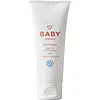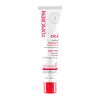What's inside
What's inside
 Key Ingredients
Key Ingredients

No key ingredients
 Benefits
Benefits

 Concerns
Concerns

 Ingredients Side-by-side
Ingredients Side-by-side

Water
Skin ConditioningParaffinum Liquidum
EmollientGlycerin
HumectantHydrogenated Polydecene
EmollientPolyglyceryl-3 Diisostearate
EmulsifyingTalc
AbrasiveCera Alba
EmollientHydrogenated Castor Oil
EmollientGlyceryl Behenate
EmollientCopper Gluconate
Skin ConditioningZinc Gluconate
Skin ConditioningManganese Gluconate
Skin ConditioningBisabolol
MaskingSodium Hyaluronate
HumectantMagnesium Sulfate
Chlorphenesin
AntimicrobialSodium Hydroxide
BufferingIngredients Explained
These ingredients are found in both products.
Ingredients higher up in an ingredient list are typically present in a larger amount.
Glycerin is already naturally found in your skin. It helps moisturize and protect your skin.
A study from 2016 found glycerin to be more effective as a humectant than AHAs and hyaluronic acid.
As a humectant, it helps the skin stay hydrated by pulling moisture to your skin. The low molecular weight of glycerin allows it to pull moisture into the deeper layers of your skin.
Hydrated skin improves your skin barrier; Your skin barrier helps protect against irritants and bacteria.
Glycerin has also been found to have antimicrobial and antiviral properties. Due to these properties, glycerin is often used in wound and burn treatments.
In cosmetics, glycerin is usually derived from plants such as soybean or palm. However, it can also be sourced from animals, such as tallow or animal fat.
This ingredient is organic, colorless, odorless, and non-toxic.
Glycerin is the name for this ingredient in American English. British English uses Glycerol/Glycerine.
Learn more about GlycerinHydrogenated Castor Oil is created by adding hydrogen to castor oil. This helps stabilize the castor oil and raises the melting point. At room temperature, hydrogenated castor oil is solid.
Castor Oil helps moisturize the skin. It is rich in a fatty acid called ricinoleic acid. This fatty acid helps prevent moisture loss on the skin. This helps keep your skin soft and hydrated. Ricinoleic acid also has anti-inflammatory and pain reducing properties.
As a wax-like substance, Hydrogenated Castor Oil acts as an emollient. Emollients help keep your skin stay soft and smooth by creating a barrier. This barrier helps trap moisture.
Hydrogenated Castor Oil may not be fungal-acne safe. We recommend speaking with a professional.
Learn more about Hydrogenated Castor OilMagnesium Sulfate is a salt. More specifically, it is an epsom salt, or the bath salt used to help relieve muscle aches.
Despite having ‘sulfate’ in the name, it isn’t a surfactant or cleansing agent like sodium lauryl sulfate. Unlike those sulfates, magnesium sulfate doesn’t have the same cleansing or foaming properties (it's simply a type of salt).
In cosmetics, Magnesium Sulfate is used to thicken a product or help dilute other solids. It is a non-reactive and non-irritating ingredient.
One study shows magnesium deficiency may lead to inflammation of the skin. Applying magnesium topically may help reduce inflammation.
You can find this ingredient in sea water or mineral deposits.
Learn more about Magnesium SulfatePolyglyceryl-3 Diisostearate is an emulsifer and emollient. It comes from Isostearic Acid and Polyglycerin-3.
As an emulsifier, it helps stabilize products by preventing oils and water from separating.
This ingredient may not be Malassezia folliculitis, or fungal acne safe.
Learn more about Polyglyceryl-3 DiisostearateWater. It's the most common cosmetic ingredient of all. You'll usually see it at the top of ingredient lists, meaning that it makes up the largest part of the product.
So why is it so popular? Water most often acts as a solvent - this means that it helps dissolve other ingredients into the formulation.
You'll also recognize water as that liquid we all need to stay alive. If you see this, drink a glass of water. Stay hydrated!
Learn more about Water